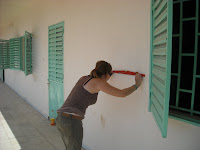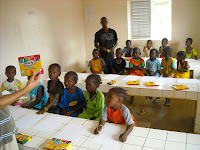Hey all,
It's been quite a while since my last update, but I figure now that the day to day stuff of my service seems a little mundane, it's worth waiting until I have a bulk of stuff to write about.
Starting with an update on the well that was under construction at the time I last wrote, it unfortunately remains that way. Though it's near completion, other projects and a general incompetence when it comes to customer service have kept the masons away for the better part of the last few months; though they've been good enough to provide me with plenty of promises to tide me over til it's done. In the meantime, I'll be doing what I can to try and move forward on the rest of this larger-scale community garden, of which this larger-scale well is meant to be a part.
My own agricultural work has been going pretty well, though I find myself a little swamped playing a game of catch-up after having been out of site for a little over a month. My village family was honored to have members of my actual family, Patrick and Molly Hanlon (my cousin and his wife, my cousin "in-law"?), come to visit the village for about 4 days. They were very proud and humbled to have Samba's family travel from a literal and figurative world away just to come see how I've been living for just shy of two years; and how they've lived their whole lives. They were thrilled by the gifts Pat & Molly brought but they were very emphatic about having me translate that their coming was gift enough, and that they would like to speak to them, if only they could. As I said, it was about 4 days with some time fit in to experience a bit of the Bassari culture (another ethnic group in the area) with my friend and fellow PCV Lindsay and her counterpart.
All told, Pat & Molly's visit lasted about 2 weeks, with time in Dakar before heading down to Kedougou and a couple of days before leaving as well. Between the village and their return to Dakar, however, we had the pleasure to travel up to the beach town of Popenguine for a fishing trip with my friend Ankith, the PCV who has been posted their working in eco-tourism for the past 2 years. Unfortunately, due to inclement weather the night before, the captain decided to cancel since, despite beautfiul weather the day of, the previous night's storm would make the water still too choppy farther out. In any case, we still got a beautiful day at the beach and were able to grill out that night; not fish we caught ourselves, as planned, but just as good.
Ankith was generous enough to let us stay with his family an extra night so we would have a place to celebrate the Muslim holiday of Korité, which marks the end of the month-long fasting of Ramadan. I had been wondering what we would do for that, given we'd already be out of my village by that time, but Ankith's host family welcomed us and stuffed us on chicken, fries and salad. Korité is somewhat like Easter in that most people venture to the church (or mosque, in this case) in the morning, then come home for a big mid-day meal; though for them the eating itself is significant since it's being done at a time of day during which they have been allowed to eat for the past month.
We headed back to Dakar after that to get them back in time for their flight and do some last-minute site-seeing, and shopping. Molly has this thing for baskets I'd rather not go into, but in any case, we found some genuine Senegalese woven baskets and mats that are popular here, so she was happy.
I was thrilled and so grateful to have them come visit, if not just to have someone from back home experience my new life here firsthand. I hope they had as much fun as I did, and I, for one, know my family here won't forget them or their generosity for a very long time (probably never). Thanks guys!
I mentioned being away from site for a while, and traveling with Pat & Molly was only the tip of the iceberg. The day I dropped them at the airport was the same day the newest batch of volunteers-in-training were heading to Kedougou for the Volunteer Visit portion of their training, in which they travel to the region, and sometimes even the site, that they will ultimately go to upon swearing-in. It's a good opportunity for them to get a taste of what their next 2 years of service will be like, and I know for me it was a motivation to get through the last of training. Anyway, I'm sure I've talked about it at length in past updates, since this marks the 4th group of trainees that have done this since I've been here. I'm officially old.
Needless to say, I wouldn't be making it down in time from Dakar, so I went back to Popenguine to hang out with Ankith and the trainee who would be his replacement while he showed her the ropes (thanks again, Ankith). Once the visit was done I was meant to be back in Thies to help out at the training center, which I was able to do for one day before the trainees went back to their training villages.
Then I went back to Dakar to travel to Burkina Faso (another West-African country). My first (official) trip out of Senegal in 2 years! I got asked to go along with two other volunteers from my original group who would also be doing third years, but in Agroforestry. It was a conference put on by the Educational Concerns for Hunger Organization (ECHO; www.echo.net), based out of Florida. It was the first meeting of its kind in West Africa, bringing people from many different countries and organizations of which Peace Corps was just one of many. It was a great learning experience and we were sent with the idea that since we had already done 2 years and would be doing a third, we might be good candidates to disseminate this info to other PCVs. Here's hoping.
After 5 days, we came back to Dakar and I myself headed BACK to Thies to the training center to help out with the famed Counterpart Workshop. It's a chance for host-country nationals chosen as counterparts for PCVs work to come meet their Volunteer prior to their install to talk about plans for their arrival, the first 3 months, etc. They also get sessions on safety and security, helping their PCV learn the language, dealing with misunderstandings, and general awareness of what being a Volunteer means. I mainly acted as translator between Volunteers who were learning the same language as myself and their counterparts, but it felt good to do it.
Once that was over it was back to Dakar with the intention of returning to Kedougou ASAP. Through my multiple trips back and forth I had been working on my 3rd year medical clearance and that was finally complete, but now I had about 10 other Volunteers from my original group of 2 years ago coming into Dakar to do their Close of Service (COS) and, effectively, go home (or leave, in any case). So, given the choice between leaving immediately for Kedougou or waiting a couple extra days until another group of PCVs from the region would be organizing a car to go back, I decided to stay and spend some time with these people who had been my friends for 2 years; and some my closest neighbors. We had a great time reminiscing about our own training and our experiences together. It was certainly tough to say goodbye and even harder to believe it was over in what felt like both a heartbeat and an eternity at once. But our paths will likely cross again; they don't seem the type to settle down anytime soon.
I made it back to the village for a whopping 3 days before heading back into the town of Kedougou to, believe it or not, greet those newly sworn-in Volunteers and help them prepare for their installs (again, for the 4th time). I came back accompanying Lindsay's replacement, whom I think is very excited to be out in mine and Ian's (my second closest neighbor) neck of the woods (aka the boonies). And we're very excited to have her, though it will be strange without Lindsay.
Let's just hope she makes a good third for our Thirsty Thursdays. I'm sure she'll learn.
Thanks!
Til next time,
Steve "Samba" Sullivan




























